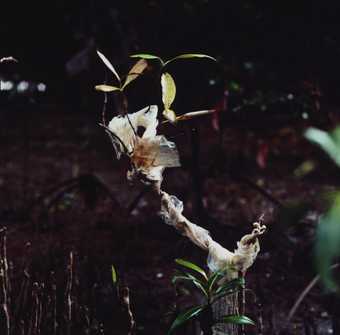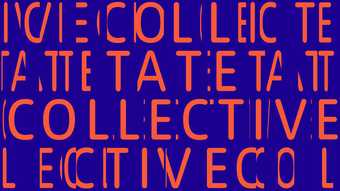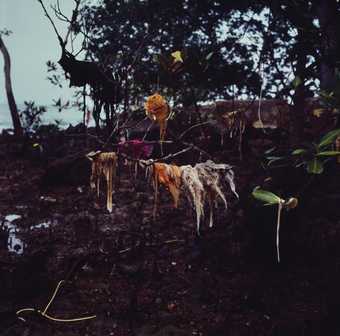
Simryn Gill
Channel #27 (2014)
Tate
Every two or three years I visit Singapore – my mother’s home country. As a child, I remember seeing the phrase ‘Singapore is a fine city’ plastered all over souvenirs for tourists to purchase and take home. I asked my mother what that meant and why that was the case: ‘Because there are fines for everything,’ she replied, ‘especially littering. That’s why Singapore is so clean.’ She was right, Singapore does have fines for everything, and over the years I would hear people criticise its strict rules and regulations. ‘You don’t have chewing gum there?!’, is the question I would hear the most. No, we don’t; that’s why Singapore is so clean.
Just like my mother, the artist Simryn Gill was born in Singapore. And, like me, she lives in between Asian and Western cultures (Malaysia and Australia for Gill, Singapore and England for me). The coast of Port Dickson in Malaysia, where Gill shot her photographic series Channel 2014, is located just a threehour drive from the Singapore neighbourhood I consider my second home. Yet the coastlines of our countries look strikingly different. Singapore’s coastline is almost spotless, whereas Channel captures an environment draped in waste and debris.
So why is that? Malaysia’s stance on littering isn’t too different from Singapore’s. Strict fines of up to £18,500 are given to those who are caught committing this crime. But, unlike Singapore, Malaysia is prone to illegal dumping, primarily from Western countries like England, Australia and America. This form of environmental racism is an issue that not only severely affects the environment, but also helps to maintain the ‘third-world’ status of many countries in Southeast Asia.
This damaging effect is prominent in Gill’s Channel #27, a photograph showing a plastic bag intertwined with an emerging leafy shoot. Southeast Asian countries are often criticised for not growing past their history of colonisation, as if it’s as easy as ripping off a plastic bag. Channel #27 mirrors this idea – no matter how flimsy a material, when twisted around something it becomes inescapable and imperishable. Just as the plastic bag overtakes the branch, Western influence remains strong in the Southeast, constricting and blocking growth.
As a series, Channel evokes a lot of pain in me. When asked about her approach to her work, Gill once said: ‘My relationship to place-ness is very wobbly and kind of ambivalent.’ I feel like this sentiment is felt by many who share a similar background to Gill and me – those of us who live between two countries, and find it difficult to settle in either place. Although Gill’s collection of photographs may be a documentation of Port Dickson, for me, it captures what I like to call the ‘diaspora dilemma’: the discomfort and disappointment of seeing one of your homes suffer due to the actions of the other. This internal conflict is a feeling I find difficult to comprehend; perhaps Gill feels it too.
Simryn Gill’s Channel series was purchased with funds provided by Tate Members, Tate Patrons and Tate International Council in 2018 and is on display as part of Photography and the Environment, Tate Modern, from 15 March. Curated by Valentina Ravaglia, Curator, Displays and International Art, Tate Modern.
The Tate Collective Writing Prize is an open call for submission inviting all Tate Collective members to respond to artworks in Tate’s collection. The winning submission was chosen in collaboration with Tate Collective Producers based in London, Liverpool and St Ives: Arada Banson, Bethany Sewell, Emily Sorrell, Laura Wiggett and Emily Zirong Lyu. Tate Collective is Tate’s membership scheme open to 16–25 year olds worldwide. To find out more visit tate.org.uk/tate-collective. Tate Collective is supported by Jean and Melanie Salata with additional support from Garfield Weston Foundation, The Rothschild Foundation, and Tate Patrons.
Geri Chan-Blackburn is a Singaporean-British freelance writer and a Tate Collective member living in Cambridge.



